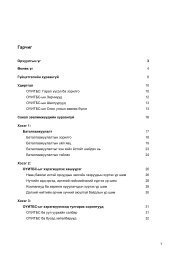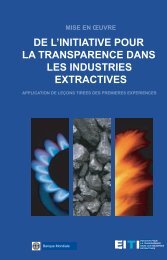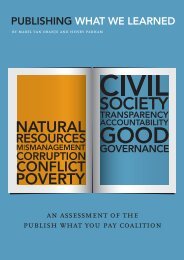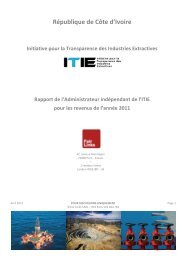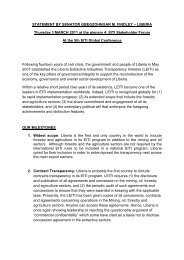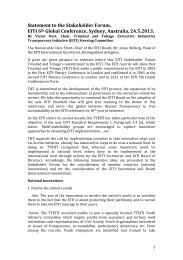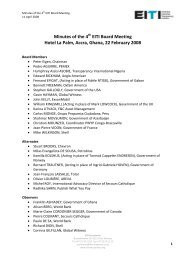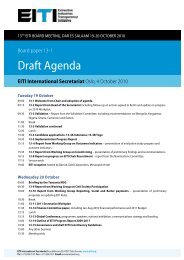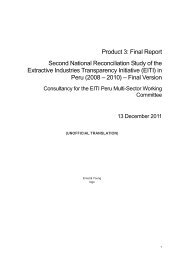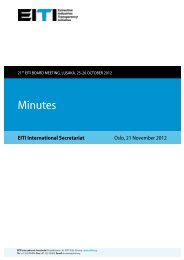Vietnam feasibility study - EITI
Vietnam feasibility study - EITI
Vietnam feasibility study - EITI
Create successful ePaper yourself
Turn your PDF publications into a flip-book with our unique Google optimized e-Paper software.
v.5 - InTernaTIOnal eXPerIences frOm ImPlemenTInG cOunTrIes In THe wOrlD<br />
lessons from ghana<br />
Ghana is a mineral resource rich country with a variety of minerals such as gold, diamond and<br />
bauxite. The extractive industry contributes largely to the state budget and the national GDP. For<br />
instance, profit from gold exports accounted for 34% of total export and 12% of GDP in 2003 and<br />
2004, respectively (http://eiti.org/Ghana). However, Ghana is one of the countries earliest facing<br />
instability resulting from the extractive industry. Therefore, it signed up to the <strong>EITI</strong> in the early period<br />
(June, 2003) and was accepted to be an <strong>EITI</strong> candidate in August, 2007. With the cooperation of<br />
the Ministry of Finance and Ministry of Minerals, Ghana has established two organizations to carry<br />
out the <strong>EITI</strong> program, namely the <strong>EITI</strong> National Steering Committee (NSC) and the Ghana <strong>EITI</strong>. NSC<br />
helps all stakeholders to have a deeper understanding about the <strong>EITI</strong> and to closely engage with<br />
them. The GH<strong>EITI</strong> is responsible for implementing, overseeing and evaluating the program and<br />
supplementing the NSCs’ decisions to be more effective. After seven years of implementing <strong>EITI</strong>,<br />
Ghana has achieved remarkable successes. For example, the transparency of revenues generated<br />
from the extractive industry has increased. This initiative brought a closer cooperation amongst<br />
the stakeholders and resulted in a higher credit rating for the government. The <strong>EITI</strong> in Ghana has<br />
provided some valuable lessons for other countries:<br />
• The first experience when implementing the <strong>EITI</strong> is that the country should implement the<br />
initiative in the early stage. The foremost issue when implementing the <strong>EITI</strong> was to enhance<br />
the transparency of revenues to the local community. However, instead, Ghana designed a<br />
plan to carry out the <strong>EITI</strong> at the national scale from the beginning. This action proved to be big<br />
advantage.<br />
• Second, the <strong>EITI</strong> program should be implemented in a timely manner. The <strong>EITI</strong> in Ghana was<br />
slowly implemented, especially in the starting years. Although the government decided on the<br />
<strong>EITI</strong> in 2003, the <strong>EITI</strong> Board and the first financial report were not established and released until<br />
2005 and 2007, respectively.<br />
• Third, the commitment of stakeholders is the key to assuring a successful program. In Ghana,<br />
the commitment of the government was expressed through the community’s activities using<br />
internal resource and external support during the <strong>EITI</strong> implementation.<br />
• The last but very important lesson is that the <strong>EITI</strong> implementation should be continuously<br />
managed. Experience from Ghana suggests that the <strong>EITI</strong> program should not concentrate too<br />
much on expanding the management infrastructure management, but rather on finding the<br />
simplest way to implement the initiative in a timely manner.<br />
lessons from nigeria<br />
Nigeria is a very rich country in mineral resources, particularly in oil with a potential reserve of 32<br />
billion barrels. The oil and gas industry contributes over 95% of export revenues and 65% of state<br />
income (EIA, 2010). However, Nigeria is still one of the poorest countries in the world, in which 70%<br />
of the population are poor (based on a national standard) and 83.9% of the population earn under 2<br />
dollars/day (UNDP, 2009; Rural Poverty Portal, n.d.). Furthermore, social conflicts and unstable politics<br />
related to oil profits often happen.<br />
In response to a serious lack of transparency and a huge loss of oil revenues, the former Nigerian<br />
President, Mr. Olusegun Obasanjo decided to implement the <strong>EITI</strong> in 2003. The <strong>EITI</strong> committee was<br />
established in 2004. In May, 2007, the Act on <strong>EITI</strong> was adopted and Nigeria was accepted to be an <strong>EITI</strong><br />
candidate in October 2007 (http://eiti.org/Nigeria).<br />
The 2005 <strong>EITI</strong> audit report (just released in 2009) indicates a discrepancy of 800 millions USD (equal<br />
The Extractive Industries Transparency Initiative and the Implementation Perspective of <strong>Vietnam</strong><br />
55



